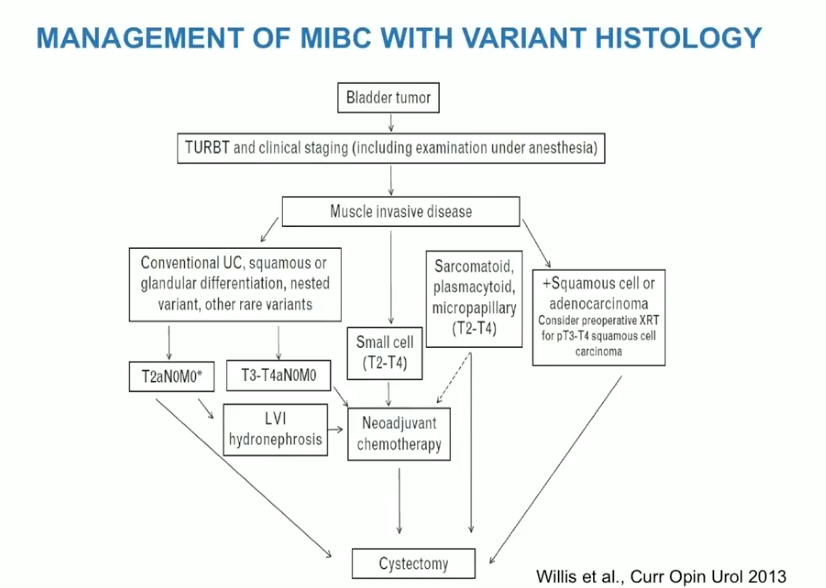Seth P. Lerner, MD presented “Case Based Decision-Making for Treatment of MIBC” during the 23rd Annual Innovations in Urologic Practice on September 14, 2018 in Santa Fe, New Mexico.
How to cite: Lerner, Seth P. “Case Based Decision-Making for Treatment of MIBC” September 14, 2018. Accessed [date today]. https://grandroundsinurology.com/case-based-decision-making-for-treatment-of-mibc/
Case Based Decision-Making for Treatment of MIBC – Summary:
Seth P. Lerner, MD, provides a brief overview of variant histologies in muscle invasive bladder cancer (MIBC). He then reviews individualized management options and optimal decision-making for treating the disease using three unique cases.
Abstract:
Variant histologies appear in 6%-25% of transurethral resection (TUR) samples from patients with MIBC. American Urological Association (AUA) guidelines state that an experienced genitourinary pathologist should review the pathology of a patient with suspected variant histology or if muscle invasion is equivocal. European Association of Urology (EAU) guidelines corroborate this in a similar statement. According to World Health Organization classifications, of urothelial carcinoma (UC) variants, squamous differentiation, neuroendocrine, and micropapillary variants are the most common. However, the National Cancer Data Base reports that non-urothelial variants are relatively uncommon. Markedly, in a multivariable Cox proportional hazards model, urothelial variant histology proved to confer a worse prognosis than non-variant disease.
This presentation follows three unique cases as an illustration of appropriate decision-making in management of MIBC. The first case discussed in this presentation involves a patient with a T1 high-grade UC, as well as a micropapillary variant. The second case follows a patient who presented with a high concentration of squamous cell differentiation. Finally, the third case follows a patient with T3 UC with a neuroendocrine phenotype and small cell features. By reviewing the challenges and decisions made during these cases, this presentation identifies optimal application of neoadjuvant chemotherapy, preoperative radiation therapy, cystectomy, and other management options for individualized situations.
About Innovations in Urologic Practice
Innovations in Urologic Practice (IUP) is an annual CME-accredited conference devoted to updating urologists on the rapidly changing healthcare environment. Topics focus on innovative diagnostic and treatment strategies, controversies, new and currently developing technologies, and challenges in today’s urologic practice. Dr. Lerner presented this lecture during the 23rd IUP in 2018. Please visit this page in order to learn more about future IUP meetings.
ABOUT THE AUTHOR
Seth P. Lerner, MD, FACS, is Professor of Urology and Vice-Chair for Faculty Affairs in the Scott Department of Urology at the Baylor College of Medicine in Houston, Texas. He holds the Beth and Dave Swalm Chair in Urologic Oncology. Dr. Lerner is the Director of Urologic Oncology and the Multidisciplinary Bladder Cancer Program, also at Baylor.
Dr. Lerner earned his medical degree from the Baylor College of Medicine, completed a surgical internship at Virginia Mason Hospital in Seattle, and returned to Baylor for his residency training. He completed a two-year fellowship at the University of Southern California in Urologic Oncology and Reconstructive Surgery and joined the full-time Baylor faculty in 1992.






